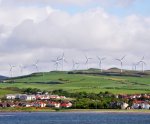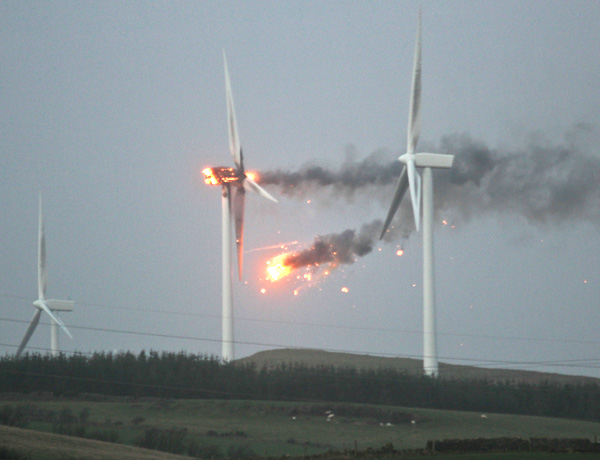Can you cite an example of when this has ever happened ? I'm currently paying 50% more for my energy than I was in 2009 underwriting this nonsense
These are policy issues. The fact is that power from a wind farm in the large scale can be produced for less than virtually any other source. If your paying more, that sounds like bureaucracy or a an attempt by competition to influence decisions so that people like you dislike it.
You really don't think one of the most profitable industries in the world doesn't see the threat of wind energy? You really can't imagine a world where the trillions in profits made from fossil fuels could be used to influence politics? Don't be so naive.
Having said that, I've already shown you that the prices are still coming down, output and efficiency are rising. Much of that taking place in just the last few years. Countries that invested 10, 15 20 years ago have infrastructure that is less capable then if you started fresh today. That's one of the penalties of jumping on the bandwagon too early. We suffered the same problem with cell phones in the US.
Read the first paragraph and you'll see my claim is substantiated.
Trends influencing the costs of wind power
This is from the same page the info-graphic showing the high costs that you and saywer are posing. It shows that when purchasing power is added to the equation, that things aren't quite as bad:
http://shrinkthatfootprint.com/wp-content/uploads/2013/09/electricppp.gif
Wind, solar and energy et al are not affordable or sustainable.
I disagree as far as wind is concerned and I've already shown evidence to why this is so. As I said before we can just agree to disagree on this point. There is more than one type of solar, but by and large solar needs more study and we're a long way from commercial viability, so to some extent I agree. Tidal, hydro, and geo are all viable, but all of these technologies are very limited by location.
Renewable energy schemes can no longer be justified by claims that we are rapidly running out of fossil fuels or causing dangerous manmade global warming. Oil sands and hydraulic fracturing have obliterated the depletion myth, while climate change fears are belied by a 16-year hiatus from planetary warming, historic lows in hurricane and tornado activity, and the abject failure of CO2-focused climate computer models.
I never claimed, nor do I believe that we are running out of fossil fuels, but as I told sawyer, that's not the only issue. As the population increases and 3rd world nations like China and India modernize, this will place increased demand on those resources which, as I believe has already been pointed out, have risen in cost over 100% in the last decade. Not to mention the volatility in the parts of the world where most of the low cost fossil fuels come from. Developing energy sources that aren't depending on the global political climate is a definite positive.
As far as global warming, point me to a global warming debate thread and we can argue that point there, but I think your wrong. There is lots of evidence to global warming, even without computer models. The fact that you point to claimed 16 year hiatus in temperature just tells me that you read more blogs on the subject and don't really understand the science, but again, if you really want to belabor this point, I'm game, at least for a few posts, but lets do it in another thread. You pick and I'll meet you there.
In other words, the craze for renewables is driven by religious zeal, not science or economics.
Germany's wind power chaos should be a warning to the UK - Telegraph
Let me be the first to admit that there is a lot of unrealistic zeal. If the zealots scream loud enough and they have enough influence, then promises get made that can't be fulfilled undermining an other words viable long term solution. In the long term these kinds of people *cough* Al Gore *cough*, are in it for the attention and power and, imo, while they are supporting good ideas, they disseminate misinformation with the rational that the ends always justify the means, that only hurts the very movements they claim to support and as a result I'm happy to call out pin heads like Gore.
Or maybe they do because Germanys prices arent far behind Denmarks. Germany is another country starting to regret this too.
Again:
Trends influencing the costs of wind power
Now let's move to Christopher Booker, the man that wrote the article you cite....
He is educated in history, not science.
He believes in intelligent design.
He doesn't believe that second hand smoke or asbestos are problems and of course climate change.
He is a conservative writing for a conservative paper, clearly has an agenda and no scientific background...Sorry, no credibility.
Christopher Booker - Wikipedia, the free encyclopedia
You dont think the duplication of energy transmission infrastructure when you do not need to represents a massive cost ? Capturing, converting and transmitting energy from any source requires an infrastructure – which involves construction, maintenance and eventual replacement, all of which require land disturbance, raw materials extraction and processing, energy and investment. There is no pure fountain from which to drink – only limited options, each with its own upsides and downsides. However, those who champion renewables have consistently misrepresented the human, environmental, capital, manufacturing and maintenance costs of providing reliable, affordable energy in sufficient quantities to power a modern economy and maintain desired living standards.
Yes because the energy that comes from a windmill is somehow different from energy made from traditional sources. :roll:
Look, sarcasm aside, there is no need to run duplicate lines. There are many cases where current lines cannot sustain the power of newly installed windmills. This requires upgrading current infrastructure. These costs will vary widely based on regional management of power infrastructure over time.
Perfect example:
Inadequate transmission lines keeping some Maine wind power off the grid | The Portland Press Herald / Maine Sunday Telegram
While you are correct that there are infrastructure costs, this is the same problem that every country on earth faced when moving to cell phone, or from steam to diesel locomotives, or when we installed a network of gas stations or pipelines to move fuel around the country. Yes it's new technology, it has costs, they will be higher at first and will decline over time to the point that costs will decrease relative to what you pay today.
If that doesn't happen where you live, you have a policy problem. It is possible to take a good idea and mismanage it.
Yes it does. Beware the power of green corporatism in our media. My skyrocketing bills tell me all I need to know about the UKs economic madness here. Believe me you dont want this puppy in your home
/sarcasm on. Yes we should all judge the feasbility of wind power based on your electric bill. /sarcasm off
The reverse has always been true to date According to a recent Liberum Capital report, more than £160 billion needs to be invested in our energy sector by 2020 if the current policies remain in place. Another £215 billion will then be needed by 2030. Without government green policy only £71 billion would be needed this decade and less than £80 billion in the following decade. You asked for massive cost well you got it
Energy special: The green jobs myth » The Spectator
And one again, there are lots of costs hidden in those numbers.
The wildlife dynamic is something I'm indifferent about. Though I will say tearing up our most beautiful environments in order to save them is a green rationale lost on me.
View attachment 67154990
Change is difficult
And yes, this is so much prettier.....
Course there are the intangibles...
Colossal wind failure
Colossal fossil fuel failure
Nuclear failure
(exceeded pic limit)
Chernobyl disaster 25th anniversary - The Big Picture - Boston.com
Inside Fukushima | Reuters.com
Three Mile Island: The Rest of the Story...
The Tragedy of the Love Canal • Damn Interesting
How much do these failures cost taxpayers in fees you'll never see? I mean it's not like US taxpayers get a bill in the mail for their share of the BP oil spill.....So when your calculating costs, these are rarely if ever reported as part of the cost.







